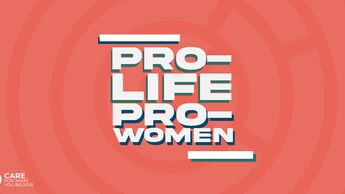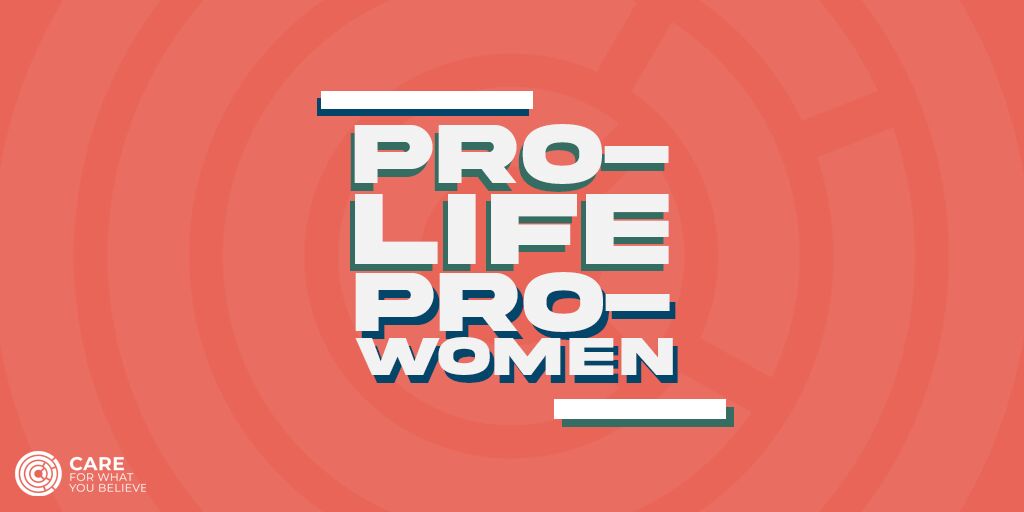
Contrary to popular opinion, it’s possible to be a young woman who cares deeply about women’s equality, and yet also believe that abortion is morally unjust and fundamentally in opposition to this equality.
It’s also also possible to be ‘secular’ and pro-life, because although a Christian worldview imbues every human being with innate dignity as an image bearer of God, there are other reasons why someone who doesn’t see the world this way could still reach a logically-consistent conclusion that abortion is wrong — whether based on scientific evidence, philosophical arguments or personal experience.
In fact, there are many people who subscribe to this perspective who just don’t fit the classic 'pro-lifer' description, rendering the all-too-common ad hominem attacks on pro-lifers redundant.
My own conclusion on this issue has been reached based on a variety of sources of evidence that inform and shape my worldview. So here are three reasons why I, personally, take a pro-life stance on the issue of abortion:
1. I recognise the personhood of a preborn baby from conception
The first time I began seriously to consider the subject of abortion was at law school. I ended up choosing an essay question which asked you to examine the legal status of a foetus, and I spent months delving into the legal and ethical debate about whether it was a person or not.
As I read arguments by ethicists and scholars, going endlessly back and forth about what exactly constitutes personhood, I began to realise that trying to define a person this way was a completely arbitrary exercise. On the whole, they reason this: that the foetus is indeed a human being, but that it is not a person until it is independent of the mother through birth. Such a dualistic division between ‘human being’ and ‘person’ leaves the foetus in the middle ground of ‘sub-human’, particularly in its relation to the overriding interests of the pregnant woman.
This seemed to me to be a dangerous road to go down: if your personhood is so subjective, then it can easily be taken away or denied by another. That is why I agree with pro-choice ethicist Kate Greasely, who argues that such a viewpoint should be treated with caution (although she ultimate concludes it is a valid one).
As she argues, previous attempts to separate the characteristics of human personality have led to "grave moral error’" where similar justifications have been made for genocide and slavery. "If we are right to do so with fetuses", Greasely argues, "this will turn out to be the only case in which a class of human beings has been correctly excluded from the personhood category. The classification ‘human sub-person’ is, in other words, a deeply suspect one, and this alone gives us considerable reason to pause and reflect before denying the personhood of fetuses."
This is the conclusion I ultimately reached at law school: if you’re a human being then you’re a person. Scientists have concluded, almost universally, that the embryo is, considered to be a human being from conception. Not a clump of cells, not an organ, not a tumour; none of those definitions are scientifically correct. It is a totally unique, living, whole human organism from conception.
Any other definition of personhood, or any other point at which a foetus suddenly becomes a person, is arbitrary and subject to a dangerous categorisation of the constituents of personhood, which in turn affects people after birth too. For example, is it any wonder that people with disabilities are told ‘you should have been aborted’ when they are so often categorised in the womb as something that should not come into being?
If an unborn baby is a person, this changes the entire debate on abortion and it’s why attempts to suppress the humanity of the unborn are seeming increasingly illogical with the scientific knowledge of foetal development now in our hands.
2. I care deeply about women, and I see that abortion hurts them
I’m not going to pretend that all women experience harm from abortion, or regret their abortions. I’ve got friends for whom I know this was their experience.
However, what I do perceive is a consistent narrative, both in the academic literature examining the mental health impact of abortion, and from honest accounts — even from those on the pro-choice side — that abortion can be very harmful for some women. The fact that this evidence is persistently ignored or denied is baffling to me.
The problem is that there isn’t any conclusive evidence on the subject. Some studies say that abortion leads to an increased risk of mental health problems, by as much as 81 per cent. Some say that abortion leads to a small to moderate increased risk.
What we can at the very least argue is that abortion doesn't have a therapeutic value i.e. it doesn't lead to either positive or negative mental health outcomes. What is also largely undisputed is that for women with pre-existing mental health conditions, the risk of mental health problems after abortion is much higher.
Anecdotally, however, it's a different picture. It’s frustrating when I meet women who tell me in detail how much they suffered as a result of their abortion, but this reality is often silenced when the subject is discussed publicly. Statements that compare abortions to removing a bunion do a huge disservice to women for whom it felt absolutely nothing like that.
For some women, abortion is profoundly distressing. Even women who say they don’t regret their abortions often talk about the sadness and despair they felt afterwards. I sometimes read personal accounts of abortion, like this anonymous thread on Mumsnet, and I feel so grieved hearing the pain that women are going through as they look back at their choice. Even if you don't regret your abortion, that doesn't mean it was good for you and it doesn't mean you won't regret it someday. It can still hurt you profoundly.
As I've spoken with more and more women who have come to a place where they can speak about this grief, I long for them to experience healing and restoration. There is no judgement for them: I only want to treat them with the most sincere compassion.
This anecdotal evidence, along with some of the literature that supports this view, has led me to the inevitable conclusion that abortion doesn’t lead to women truly flourishing in society — that it can really cause women deep distress. What kind of friend or advocate for women would I be if I didn't at least try to question the narrative that argues it is essential for women's progress?
3. Abortion does not lead to a more equal society
Even if I didn’t believe in the personhood of unborn babies, and didn’t particularly see how abortion harms women, I could still question whether abortion has actually helped women gain equality with men.
The earliest feminists were pro-life, because they saw that abortion was a sign that society had failed women. Mary Wollenstonecraft, seen as one of the earliest feminists, was anti-abortion. Similarly, suffragist Alice Paul described abortion as "the ultimate exploitation of women".
It was only in the 1970s when abortion really became a signifier of women's equality and liberation. For example, the women's liberation conference in 1970 in Oxford adopted abortion as one of the four basic demands of feminism. Similarly, the National Organisation for Women in the US adopted abortion as one of their key aims when Betty Friedan was persuaded to do so by eugenist and Malthusian Larry Nader. In essence, it was the eugenics-influenced sexual revolution that promoted abortion and feminists simply took up the mantle. Nowadays, we are left to live with the consequences of that movement.
This is the question I keep coming back to: why do women have to deny an essential and wonderful part of our biology, undergo an often painful procedure, potentially experience grief and pain following an abortion, all in order to obtain that golden chalice of equality with men?
Legal scholar, and former pro-abortion supporter, Erica Bachiochi summarises this contradiction perfectly as a betrayal of women:
Abortion would seem to provide women with a practical response to the disproportionate responsibility sexual intercourse can lay at our feet. But abortion, which is often the assumed solution to unexpected pregnancy in our culture, attempts to cure that sexual asymmetry: the biological fact that women get pregnant and men don't. It does this by putting the responsibility to care for — or dispense with — the life of a nascent, developing human being on women alone.
Abortion expects nothing more of men, nothing more of medicine, and nothing more of society at large. Abortion betrays women by having us believe that we must become like men — that is, not pregnant — to achieve parity with them, professionally, socially, educationally.
And what equality do women truly have today because of abortion? As I explained in this article for Premier Christianity magazine, the fact that 1 in 4 pregnancies today end in abortion is a sign that society has failed women.
Women cite a variety of reasons why they choose abortion. Yes, this includes limiting family size (which in itself can be influenced by other factors), but it also includes financial pressures, unsupportive partners, and feeling a baby would hinder career or education. This is why the rate of abortion increases with levels of social deprivation in England and Wales: abortion is a symptom of inequality, not a solution to it.
The fundamental point is women should be equal because of who we are. We shouldn't need to sacrifice anything to have that recognised. Abortion has done nothing to solve the inequalities women face, it's just buried them.
Pro-life is pro-woman
Thus, it is for the sake of women — for my dear friends who have undergone abortions and for women I have met who have shared their heartbreaking stories with me — alongside my absolute conviction that personhood begins from the moment you are conceived, that I am pro-life. I believe these two convictions are not irreconcilable: in fact, I think to be pro-life is to be pro-woman.



Share story
3 Reasons Why I’m a Pro-Life Woman